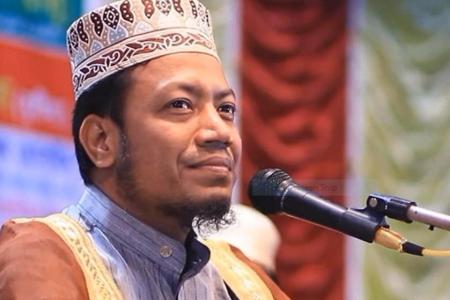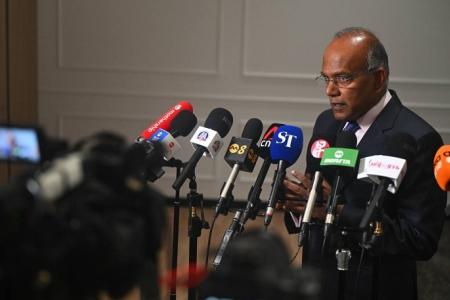Bangladeshi preacher probed for giving illegal sermon
A Bangladeshi national who had previously been arrested by his government for alleged terror links entered Singapore and preached to migrant workers at a dormitory here on Aug 9 without a permit.
The Ministry of Home Affairs (MHA) said on Aug 21 that it is investigating the preacher, Amir Hamza, and others involved in the event, including the organiser, and will take strong action if they are found to have breached Singapore’s laws or posed a security concern.
Possible action includes deportation, prosecution or detention under the Internal Security Act, said the ministry.
“Amir Hamza’s sermon propagated extremist and segregationist teachings that were dangerous, and detrimental to Singapore’s communal harmony,” it added in a statement.
MHA said the Internal Security Department (ISD) was aware of Amir Hamza and his background, but that the Bangladeshi had used a passport which bore a different name from that in its databases to enter Singapore on Aug 9. It also did not have his biometrics at the time of his entry.
Minister for Home Affairs and Law K. Shanmugam told reporters on Aug 21 that from all appearances, the passport looked to be validly issued but with a different name, and Amir Hamza “slipped through because of this passport issue”.
The sermon Amir Hamza gave on Aug 9 took place at the Lantana Lodge dormitory at Tech Park Crescent in Tuas, he added.
He left Singapore the next day, and police received reports on Aug 12 that he had preached to a group of Bangladeshi migrant workers.
Mr Shanmugam noted that Amir Hamza had in the past given sermons that “run down secular values, promote religious intolerance, and disparage non-Muslims”.
His sermon at the dormitory suggested that non-Muslims were kafirs (infidels), and held up extremists as exemplars of religious piety, added the minister.
MHA said the sermon was also politicised, as he had called the previous government led by former Bangladeshi prime minister Sheikh Hasina “oppressors” and claimed they had sentenced individuals to death for dissent.
Amir Hamza is reportedly involved with a pro-Al-Qaeda terrorist organisation in Bangladesh, Ansar al-Islam.
He was arrested by Bangladeshi authorities in 2021 for terrorism activities, and for inciting violence through his sermons.
Three suspects arrested while planning to attack Bangladesh’s Parliament that year told investigators they were inspired by his speeches.
The preacher later confessed to misinterpreting religion and to spreading extremism in his sermons, but denied inciting his supporters to carry out attacks. He was released on bail in December 2023, according to news reports.
News about the illegal sermon was first put up on Reddit on Aug 12, with videos of a man speaking to a large crowd within a dormitory.
The post said it was worrying how “a radical preacher from Bangladesh was allowed into Singapore undetected and allowed to give a speech here to hundreds of migrant workers here at a dormitory (on) National Day”.
On Aug 21, Mr Shanmugam said Changi Airport has to strike a balance between ensuring Singapore’s security and keeping the experience for visitors friendly, and it was not possible to interview every arriving individual about their motives for visiting.
Asked if the authorities were reviewing their processes, such as at immigration checkpoints, the minister said Amir Hamza had been able to enter the Republic because his passport looked to be genuine and bore a different name.
The organiser of the event also did not apply for a police permit as required, Mr Shanmugam added.
“On the face of it, he was no different from any other person who’s coming into Singapore. So we cannot work backwards in this, but we have to see what has happened,” he said.
“We will look at it, but bearing in mind that we need to make sure that we balance the security needs with the needs of the economy too.”
Asked if Singapore is facing any radicalisation problems within the Bangladeshi migrant worker community here, Mr Shanmugam stressed that the community has largely been law-abiding.
He noted that since 2015, ISD has investigated about 40 Bangladeshi workers here. That is a very small percentage of the community, which numbers about 200,000, he added.
“But we don’t take chances; we continuously work with the different communities, we make it clear to them what is accepted in Singapore, what is not accepted in Singapore, and we will take action against anyone who attacks another race or religion,” said Mr Shanmugam.
In late 2015, ISD arrested 27 male Bangladeshis working in the construction industry here. The majority belonged to a group that subscribed to extremist beliefs such as armed jihad, and which targeted other Bangladeshi nationals to grow their membership.
All 27 had their work passes cancelled, and were repatriated.
MHA said on Aug 21 that the Government takes a very serious view of hate and extremist speech, and will not tolerate anyone who promotes views that threaten Singapore’s security, or its racial and religious harmony.
“Foreigners should also not import their politics into Singapore, and carry out activities here in pursuit of such agenda,” it added.
Get The New Paper on your phone with the free TNP app. Download from the Apple App Store or Google Play Store now



